G2N10
GenElute™ Plant Genomic DNA Miniprep Kit
sufficient for 10 purifications
Synonym(s):
Plant Genomic DNA Miniprep, Gen Elute
About This Item
Recommended Products
usage
sufficient for 10 purifications
Quality Level
greener alternative product characteristics
Inherently Safer Chemistry for Accident Prevention
Learn more about the Principles of Green Chemistry.
sustainability
Greener Alternative Product
greener alternative category
storage temp.
15-25°C
Looking for similar products? Visit Product Comparison Guide
Related Categories
General description
Application
- in isolation of arbuscular mycorrhizal (AM) fungal spores DNA
- in the purification of cetyl trimethyl ammonium bromide (CTAB)-extracted genomic DNA
- in genomic DNA isolation from leaves
- PCR
- restriction endonuclease digestion
- cloning
- Southern blots
Features and Benefits
- Starting material: Up to 100 mg of plant tissue
- Expected yield: Up to 20 μg
- Elution volume: 100 - 200 μl
- Time required: < 40 min
- RNase treatment required: No
Principle
Other Notes
Legal Information
Kit Components Also Available Separately
- C2112Column Preparation SolutionSDS
recommended
Signal Word
Danger
Hazard Statements
Precautionary Statements
Hazard Classifications
Acute Tox. 4 Inhalation - Acute Tox. 4 Oral - Aquatic Chronic 3 - Eye Dam. 1 - Skin Corr. 1C
Supplementary Hazards
Storage Class Code
8A - Combustible corrosive hazardous materials
Flash Point(F)
Not applicable
Flash Point(C)
Not applicable
Certificates of Analysis (COA)
Search for Certificates of Analysis (COA) by entering the products Lot/Batch Number. Lot and Batch Numbers can be found on a product’s label following the words ‘Lot’ or ‘Batch’.
Already Own This Product?
Find documentation for the products that you have recently purchased in the Document Library.
Customers Also Viewed
Protocols
This protocol describes a simple and convenient procedure to isolate pure DNA from a variety of plant species using the GenElute Plant Genomic DNA Miniprep Kit.
GenomePlex® Whole Genome Amplification has been used to amplify genomic DNA from soybean, corn, tomato, purple coneflower, and ginseng.
Our team of scientists has experience in all areas of research including Life Science, Material Science, Chemical Synthesis, Chromatography, Analytical and many others.
Contact Technical Service








